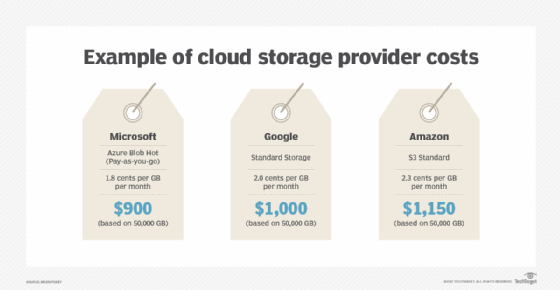
Getty Images/iStockphoto
A guide to Microsoft Azure storage pricing
Take a deep dive into the costs of Microsoft Azure cloud storage across several different types, including Blob Storage and Files. Compare pricing with AWS and Google Cloud.
Microsoft Azure storage pricing varies according to the type of cloud storage, from Blob Storage to Managed Disks. Within each type, there are tiers, reservations, time lengths and other cost considerations.
Customers should review all the various Microsoft Azure storage pricing options before deciding. It's important to choose the storage type and the level of performance that most closely matches the organization's needs. Organizations must also pay attention to the storage region. Compare the prices of multiple cloud providers. Finally, be aware of any extra fees that providers charge. Data egress fees, for example, can be substantial and may dramatically impact the storage budget.
Like other cloud providers, Microsoft bases its storage costs at least partially on the volume of storage consumed. These capacity-related costs are usually measured on a per-gigabyte, per-month basis. Microsoft defines a gigabyte as 230 bytes, or 1,073,741,824 bytes.
Azure Blob Storage
The cost of Azure Blob Storage varies widely based on the storage tier, the volume of data stored and whether it's the pay-as-you-go model or reserved capacity.
Microsoft charges a flat rate of 15 cents per GB per month for Premium storage in pay-as-you-go pricing, regardless of the volume consumed. Similarly, Microsoft bills for the Cool, Cold and Archive storage tiers at a flat rate. Cool storage costs 1 cent per GB per month, Cold is 0.36 cents per GB per month and Archive is 0.099 cents per GB per month, regardless of how much storage the customer consumes. Hot storage, however, is 1.8 cents per GB per month for the first 50 TB, and the price gradually decreases for higher usage. Customers who consume more than 500 TB per month, for example, spend 1.66 cents per GB.
Microsoft enables customers to reserve Azure Blob Storage in blocks of 100 TB or 1 petabyte (PB). Reservations can be for one year or for three years. The cost of reserved storage varies by tier. The monthly charge for a three-year reservation of Archive storage, for example, is $84 per 100 TB or $810 per PB. For a one-year reservation, the cost is $91 and $883 per month, respectively. On the high end, the monthly cost for Hot storage is $1,244 for 100 TB for three years and $1,545 per month for one year. Hot storage costs $11,963 per PB per month with a three-year reservation and $15,050 per month for one year.
Azure Files
Like with Blob Storage, Microsoft bills Azure Files based on the storage tier in use and whether the customer reserves storage capacity. The raw Microsoft Azure Files storage pricing for pay as you go ranges from 1.5 cents per gibibyte per month for Cool storage to 16 cents per provisioned GiB per month for Premium storage.
Customers can reserve storage in 10 tebibyte and 100 TiB increments for either one year or three years. A 10 TiB Cool storage reservation costs $101.39 per month for three years or $125.92 per month for one year. That price goes up to $1,081.34 for three years or $1,343.50 for one year for Premium storage. A 100 TiB reservation ranges from $983.03 per month for three years in Cool storage to $12,779.50 per month for one year in Premium storage.
Also, consider ancillary fees. These fees cover elements such as read/write transactions, metadata storage, snapshots and early deletion fees.
Azure Queue Storage
The Microsoft Azure storage pricing model for Queue Storage is simpler than that of Files and Blob Storage. Pricing ranges from 4.5 cents per GB per month for locally redundant storage (LRS) to 7.5 cents per GB per month for read-access geo-redundant storage (RA-GRS). There is also a 0.04-cent charge for every 10,000 Class 1 or Class 2 operations.
Azure Table Storage
Pricing for Azure Table Storage ranges from 4.5 cents per GB per month (LRS) to 12.65 cents per GB per month (read-access geo-zone-redundant storage), with several other pricing tiers also available: GRS, RA-GRS, zone-redundant storage and geo-zone-redundant storage. Microsoft also charges a 0.036-cent fee for every 10,000 transactions.
Azure Managed Disks
Azure Managed Disks feature a dizzying number of pricing options. Costs vary based on the disk size, reservation period, performance, disk type and capacity. The lowest-cost disk is a P1 disk, which has a 4 GiB capacity and costs 60 cents per month, plus 3 cents per mount per month. The most expensive option is the P80 disk, which is 32 TiB and costs $3,276.80 per month, plus $219 per mount per month. A P80 disk's price drops to $3,113 per month -- plus the $219 per-mount, per-month fee -- with a one-year reservation.
How Microsoft Azure storage pricing compares to other clouds
Other cloud providers also offer a variety of storage options.
If an organization needs to store 50 TB of data on cloud object storage on a midgrade storage tier, Azure is the cheapest versus AWS and Google Cloud, but that may not always be the case. The example detailed in the chart is based only on storing data at rest. Real-world costs can vary based on the fees that the providers charge for data usage.

Brien Posey is a 22-time Microsoft MVP and a commercial astronaut candidate. In his more than 30 years in IT, he has served as a lead network engineer for the U.S. Department of Defense and a network administrator for some of the largest insurance companies in America.






